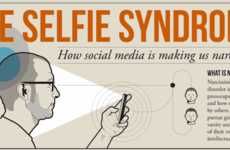
Tweeting in the Washroom Can Spread Fecal Matter and Other Viruses
Elise Ying-Hei Ho — December 18, 2012 — Lifestyle
References: emergencyplumber.uk & visual.ly
People always claim they need privacy and as one of the most private places in the house, it's surprising how many people are actually Tweeting in the washroom.
In the Tweeting on the John infographic, the chart reveals that 33% of 18 to 24-year-olds use social media while doing their business while only 15% of 35 to 44-year-olds do. Though the percentage seems small, the abundance of social media users makes this an extremely large pool. One of the biggest reasons social media is so accessible, even from the porcelain seat, is that it can be transported and used on mobile devices, which unfortunately people also bring to the washroom. According the the infographic, one in six phones have fecal matter on them and have 18 times more bacteria than the flush handle.
In the Tweeting on the John infographic, the chart reveals that 33% of 18 to 24-year-olds use social media while doing their business while only 15% of 35 to 44-year-olds do. Though the percentage seems small, the abundance of social media users makes this an extremely large pool. One of the biggest reasons social media is so accessible, even from the porcelain seat, is that it can be transported and used on mobile devices, which unfortunately people also bring to the washroom. According the the infographic, one in six phones have fecal matter on them and have 18 times more bacteria than the flush handle.
Trend Themes
1. Mobile Social Media - The trend of using social media on mobile devices, even in unsanitary locations like the washroom, presents opportunities for mobile app developers to create innovative ways to enhance user experience and privacy.
2. Sanitization Technology - The increasing awareness of unsanitary habits like using mobile devices in the washroom is driving the demand for innovative sanitization technologies that can effectively kill bacteria and viruses on smartphones and other devices.
3. Digital Privacy - With the revelation that people are using social media in unsanitary places, there is an opportunity for companies to develop privacy-focused digital tools and platforms that allow individuals to maintain their online presence without compromising their personal hygiene.
Industry Implications
1. Mobile App Development - The rise of mobile social media usage in unsanitary environments calls for mobile app developers to create innovative solutions that cater to users' privacy and convenience needs.
2. Sanitation Technology - The demand for effective sanitization technologies for smartphones and other devices presents opportunities for companies in the sanitation industry to develop and market products that address this specific consumer concern.
3. Digital Security - As the need for digital privacy becomes more evident, companies in the digital security industry can seize the opportunity to offer enhanced security measures and tools that protect users' personal information while using social media in unsanitary environments.
1
Score
Popularity
Activity
Freshness























